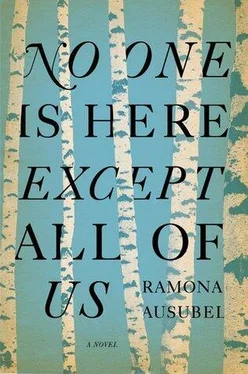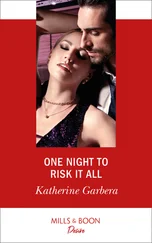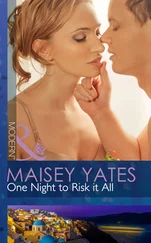The healer’s eyes looked as if they were sinking into his head. As if they were too tired to stay afloat any longer. “We would have to cross all those other borders.” Romania fell into shadow, Bulgaria, Hungary. Elsewhere might not exist after all.
The widow rolled her eyes. “Don’t you get it?” she asked. “We are dead men. We are through.”
“We are in the precise center of this continent,” my father whispered. “We are marooned.”
“And we are the plague,” the healer said, his eyes closed. Our tiny peninsula, a pinhead on the big map, was soon the only lit spot. Everything, everywhere, everyone else — extinguished.
“Should we build a wall? A barricade?” the greengrocer wondered.
“With what? Mud and cabbage?” his wife mocked.
I was in a room full of grown-ups who had no idea what to do. None of them. We were completely lost and helpless and my heartbeat turned irregular and I had to close my eyes and concentrate on breathing.
Just then, the stranger’s voice came clear and strong, “We start over.”
“We already tried. We can’t remember how we got where we are,” Igor reminded her.
“That’s not what she means,” I said, surprised to understand exactly. “She means, once upon a time, tomorrow was the first day of the world. The very, very first. The earth was unformed and void, and darkness was upon the face of the deep. ” My heart continued to flutter like a bird caught in a chimney.
And the stranger looked up at me and her gaze was so sharp that everything else in the room came to a perfect stop. She took my hand and held it for a long moment. The feel of her palm was like worn leather, thick and sturdy. “Land is limited — the space around us occupied, but no one can limit belief,” she said. The stranger looked around the room. “We need a story,” she told the villagers, but she was looking at me. “When there is nothing left to do, and there is nowhere else to go, the world begins again.”
“No one exists but us and God?” I added tentatively. “Everything is still to come?”
She let her eyelids fall shut and nodded. I could see her eyelashes darken as she began to cry.
The moon that night was a cut in the sky and our slippery eyes reflected it. Could we put our hands out and hold back the rush of time? All the things we had invented — the wheeled, the wound-up, the pulleyed — now irrelevant? The others peered at the stranger in her battered body. They listened for the shriek of thieves at our door, for wild, sharp-toothed animals. They listened for the raving river but could not even hear it slither past.
What they did was so simple: they nodded. The stranger and I nodded back.
Before this blistered world caught up with us, we nodded. Before the wreckage of a hundred broken cities landed on our banks, before we were swept away to some faraway sea, before the sky filled with silver wings and everything below turned to fire, before the tiny candle flame of our home, the last flickering light on the map was put out, we nodded. Desperation to believe joined the terror still thrumming in our chests. If we wanted to survive in this story, we had to tell it that way. We swallowed hard and waited for a reaction from the heavens. At that exact moment, while the rain turned all the leaves outside into tiny drums, made landfall and twisted its way to the river, while the animals huddled in the barn, while the slender moon stood as a reminder of light amidst its opposite, right then, nothing happened. The earth did not shake us off.
We were alone there, floating on a sea of black emptiness — all the chapters unwritten.
“The beginning of the perfect world,” I said.
“The beginning,” the stranger repeated. “The world that is beautiful. Let there be chickens. Let there be trees. Let there be us. Let there be safe places to stay the night.”
“Let there be rest for older brothers,” Igor said.
“Let there be love,” the jeweler said.
“Be fruitful and multiply,” Kayla said, smiling.
“And what of the things I remember?” my mother asked.
“You don’t,” the stranger said with her eyes closed and seeping. “There are no such things as dead children. No such thing as burned up.” Those girls with their pockets full of eggs were not dead, had not lived, had never been born, had never grown inside of the stranger’s body. She had never been a mother.
“It’s the night before the world begins,” I said. “Everything is getting ready. Everything is waiting to be alive.”
We lay down on our sides. We listened to what had not begun.
We did not see the rain flood our cemetery and dig the bones of our ancestors up. We did not see their ghosts climb into our trees, onto our roofs, into our beds. Nor did we hear the ghosts of the stranger’s children begin to leak out of their bodies and into the mountain air full with the sharp pepper of wet pine needles. We did not hear the squeal of the radio in the airplane as the pilot made his way home. We did not see the person on the other end of the radio draw up notes about the flight, the tested bomb. We did not hear our river slip across thousands of miles — through cities feverish with lost wars, and villages trying to stay quiet and unnoticed; through fields of sunflowers, fields of wheat, apple and plum orchards; alongside vegetable gardens, pastures, train tracks and front doors where mothers dangled the feet of their perfect new babies in the river, both of them smiling because the water was cold, while fire in the house promised heat. Until the river finally met, with a desperate, gleeful rush, the ocean.
In the dark of a room that did not exist yet, a yellow room with a swinging pendulum of a gas lantern in the center of the ceiling, with the red coals of a fire slowly going out and rain sheeting the windows, a room that was absolutely quiet and shielded from even whispers of life outside — hunting, searching life, all the world’s armies fading into the distance — my village and I curled up on the floor. We had refused to give up hope, and though we all knew that no incarnation of the world had ever been safe for us, no matter how beautifully God had tried to build it, we allowed ourselves to believe in this one. Perhaps, we hoped, at the last possible moment, we had made something perfect.
I began to speak. And God said, “Let there be lights in the firmament of the heaven to divide the day from the night; and let them be for signs, and for seasons, and for days and years.” We held hands, we hummed, we listened, we prayed. Some people put their lips together. We let the spit from our mouths dry in crusts on the curve of shoulders. It did not matter whose shoulder or whose mouth. We were a pile of unborn babies together, rolling in the knots of one another’s limbs, being kissed and caught and found. And let the lights in the firmament of heaven give light upon the earth.
And we hoped that it would be good.
The sun broke through the clouds and rolled up over us like it knew the whole plan. Rain continued and an arc of color spread across our sky. We voted to keep living in the houses we had already built and to keep being married to the people we were married to. There were those who protested this, who proposed we gather in the square and pair off anew, tallest to shortest. There were those who thought it would be better to put the stupid with the smart to even things out and those who thought we should try to put the smart with the smart and hope for true genius.
“But I love my wife,” my father said.
“How do you know? Today is the first day — you have never seen her before today. What if you hate her by tonight?” the banker asked.
Читать дальше












